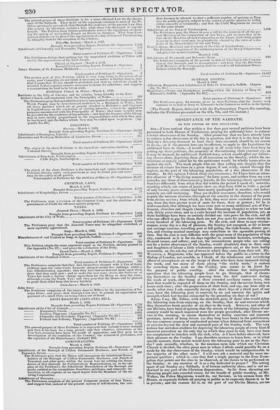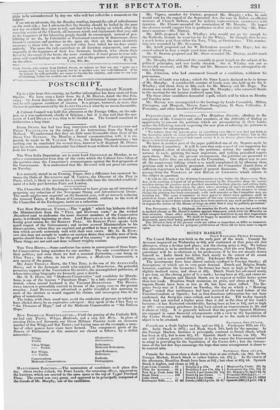OBSERVANCE OF THE SABBATH.
TO THE EDITOR OF THE SPECTATOR.
SIR—I have noticed that within a few days past several petitions have been• presented to both Houses of Parliament, praying for additional laws to enforce a better observance of the Sunday. After premising that we have already laws- to enforce a due observance of the day in question, and that it is the duty of his Majesty's Attorney-General to have these laws executed, should he see reason to ao so,—or if the present laws are insufficient, to apply to the Legislature for additional force to. them,-1 would suggest to all those who have been busy in getting up these petitions, the propriety of discontinuing their constant cry, as it may be deemed, for additional Sabbath laws, which wouldagict our labour- infl classes alone, depriving then of all recreation on the Sunday, whilst the re- strictions so eagerly called for by the petitioners would be wholly inoperative as against the rich. The weak people who are thus calling out, imagine that the increase of crimes has been in a great degree, if not solely, caused through the neglect, on the part of the labouring population, of a due observance of the Sunday. In this opinion I think them very erroneous ; for I have been an atten- tive observer of " the living manners" for forty years, and neither from my own remarks, nor those of discriminating friends, do the labouring classes spend their Sundays differently from what they did within the period I speak of; notwith- standing which, our courts of justice show us, that from 1806 to 1526, a period of only twenty years, crimes had been nearly quadrupled in number, and unfor- tunately are still increasing. They are shallow reasoners, therefore, who would impute the increase of crimes throughout the country to the absence of the poor from divine service; from which, in fact, they were more excluded forty years ago, from the then greater want of seats for them, than at present ; for be it well remarked, that although we have even now so many additional acts of Par- liament, churches and chapels (besides the Dissenting chapels) to what we had- only thirty years since, and in a ratio beyond the increase of population, yet, as these buildings have been so entirely divided out into pews for the rich, and all who can afford to pay for them, there are not free seats for more than twenty in. every hundred of the labouring poor. To the rich, and those in easy circum- stances, every day is a day of pleasure, the Sunday not excepted, as far as horse and carriage exercise, travelling post at full gallop, the club-houses, dinner par- ties, and evening musical meetings may contribute to the agreeable passing of, time. But the case is very different with the great mass of the population of this city, condensed as it is for six days together in crowded factories, workshops, ill-aired rooms, and cellars; end yet, the inconsiderate people who are calling out for a better observanceof the Sunday, would absolutely deny to these sons and daughters of labour a little wholesome atmospheric air, or the least bodily recreation, on the sole day out of seven in which they cease from their toil. Mr. WALKER, a Magistrate, who has appeared before the public in a letter to the Bishop of London, not sensible, as I think, of the wholesome and revivifying effects of atmospheric air on the lungs of those who have been immured during the week, and too many of them plying "the sickly trade," is zealous for crowding them, even on the Sunday, into rooms to be hired for the purpose of public worship. After the tedious but indispensable operation that the labouring people have to go through, that of cleans- ing themselves on the Sunday morning from the dirt contracted during the week of work, after being at these crowded auxiliary rooms twice, the
least that would be expected of them on the Sunday, and the service being two hours each time; after the preparation of their food, and say, one hour only at
meals, what time I ask, especially during the short days of a third part of our year, have the labouring poor to renovate by air and exercise the spirits and strength which had become exhausted by the preceding six days of toil? Away, I say, Mr. Editor, with the mawkish piety of those who would debar the labouring man from enjoying, on the Sunday, that air and exercise which they themselves freely partake of six days in. the week. STERNE, and other of our r Divines, have been of opinion that the morals of the labouring classes of our country would be much improved were the people permitted, after Divine ser- vice in the morning, to amuse themselves in bodily exercises and innocent pastimes, instead of being driven (as they long have been) to the publichouse, the too common resource of uneducated persons when debarred from recreations or exercise beyond the slow and measured pace of the Sunday walk. The very zealous but mistaken sticklers for depriving the labouring people of every kind of innocent recreation on the only day on which they cease to toil, have ever been too complaisant to interfere with the rich, who, as I have before observed, have their pleasure on the Sunday. I am therefore anxious to learn how, or in what specific manner, these zealots would have the labouring poor to act on the Sun- day? and, secondly, whether, in the nineteen sects into which our Christian Church is divided, the ultra pious men to whom I allude could possibly fix on a mode for the due observance of the Sunday, which would be unobjectionable to the majority of the other sects ? I will now ask a material and far more im- portant question ; which is-can they find a single passage in the Four Evan- gelists that points out the rites to be observed, or the.duties to be performed on the Sunday, or any mention of it as a day dedicated to prayer ? The setting apart of our Sunday Ise Sabbath, is of human authority alone, and is not au- thorized in any part of the Christian dispensation. So far from thrusting our labouring people into crowded rooms for the benefit of public worship, as Mr.. Walker, the Police Magistrate, would do, our Saviour, in his sermon from the Mount, as expressly for:bids all praying in public as he expressly directs-it to be- in private; and the reasons for it, on the part of our Divine Master, are too.
plain to he misunderstood by guy one who will but reflect for a moment on the subject.
1 am not an advocate, Sir, for Sunday trading, beyond the sale of refreshments on the road-side ; but I advocate that the Sunday should be hailed by the poor as a day on which they cease to toil, and that it be a holyday on which, after the morning service of the Church, all innocent mirth and enjoyments that may add to the happiness of the labouring people should be encouraged, instead of pro- hibiting as we do, by Calvinistic or Puritanical austerity of demeanour, those harmless exercises and pastimes in the open air, that are the moie absolutely necessary to those who in our crowded cities have toiled for six days conse- cutively. The more the rich contribute to all harmless enjoyments, and con- sequently to the happiness of their less fortunate brethren, who obtain their bread by the sweat of the brow, the more conducive it must prove to true reli- gious and moral feelings on the one part, and to the greater security of property
on the other. I am, Sir, acc. W. T.





















 Previous page
Previous page